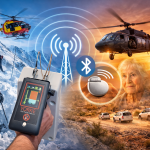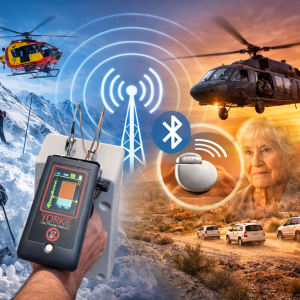Your cart is currently empty!
AirTag Found After Terrifying Florida Home Invasion: How to Protect Yourself from Digital Stalking

A Florida couple’s quiet evening turned into a nightmare when two armed men ambushed them in their own driveway. The Hillsborough County Sheriff’s Office described the incident as a “terrifying home invasion,” one that ended with the discovery of an Apple AirTag taped beneath the couple’s car — a chilling reminder that digital stalking is becoming more sophisticated and more personal.
The Shocking Discovery
On the night of August 19, the couple returned home to their Odessa residence, unaware that two suspects — later identified as Luis Charles, 26, and Omardy Maldonado-Rodriguez, 32 — were lying in wait. Surveillance footage released by police shows the men approaching the couple from behind as they got out of their car. One suspect wore a bright orange construction vest, likely as a disguise to avoid suspicion.
Within seconds, the attackers grabbed the husband and wife at gunpoint and forced them into their garage. The ordeal ended only when the home’s alarm system was triggered, causing the suspects to flee. Investigators say the victims did not know their attackers and were likely chosen at random.
Days later, deputies discovered an Apple AirTag — a tiny Bluetooth tracker often used to locate lost items — taped underneath the couple’s vehicle. It’s still unclear whether the suspects planted the device or how long it had been there, but the revelation underscores a growing threat: criminals are weaponizing consumer tracking technology to follow their victims. According to DVSN (Domestic Violence Services Network) “One in three women and one in six men will experience stalking in their lifetime.”

How AirTags and Other Trackers Can Be Misused
AirTags were designed to help users find misplaced keys, bags, or luggage. However, their precise location tracking and small size have made them a favorite tool among stalkers, car thieves, and other criminals. In this case, investigators suspect the device may have been used to monitor the couple’s movements before the attack.
Unfortunately, this isn’t an isolated incident. Law enforcement across the U.S. has reported cases in which AirTags or similar trackers were hidden in handbags, coat pockets, or even inside car bumpers. Once paired with a phone, the device silently transmits its location every few minutes via Apple’s “Find My” network — a vast system powered by millions of iPhones worldwide.
While Apple has introduced safety features that alert users if an unknown AirTag is following them, these notifications can be delayed or inconsistent, especially for Android users. That means many people may never realize they’re being tracked until it’s too late.

How to Detect and Prevent Digital Stalking
Digital stalking — using technology to track or harass someone — combines old-fashioned intimidation with new-age tools. Fortunately, there are steps you can take to protect yourself.
1. Listen and Look for Tracking Alerts
If you have an iPhone, pay attention to “AirTag Found Moving With You” alerts. Android users can install Apple’s free Tracker Detect app or use Google’s Find My Device system, which now includes unwanted tracker detection. Any unexpected notification should be taken seriously — especially if you’ve recently been in public areas, parking lots, or unfamiliar places.
2. Inspect Your Vehicle and Belongings
Regularly check hidden or hard-to-see areas on your car: under wheel wells, behind bumpers, and beneath seats. Small trackers are often attached with magnets or tape. If you suspect you’re being tracked, don’t remove the device immediately — contact law enforcement so they can preserve evidence.
3. Limit Sharing of Personal Location Data
Criminals often combine physical tracking with online stalking. Review your privacy settings on social media and disable automatic location tagging. Avoid sharing your daily routines or upcoming trips publicly.
4. Use a Wireless Scanner to Detect Hidden Trackers
Professional-grade RF (radio frequency) scanners can identify Bluetooth and other wireless signals that typical phones miss. These handheld detectors can pick up rogue devices broadcasting nearby, even if they’re hidden or disguised.
5. Stay Vigilant with Smart-Home and Bluetooth Devices
Modern stalkers may exploit smart home systems, car connectivity, or Bluetooth accessories. Regularly reset your Bluetooth pairing lists and remove unknown devices. Use strong, unique passwords for all smart systems.
The Broader Threat of Technology-Enabled Stalking
The Florida incident highlights a disturbing evolution in personal crime — one where digital tools are as dangerous as physical weapons. It also underscores the importance of proactive security awareness. According to the National Network to End Domestic Violence, over 70% of domestic abuse survivors report being monitored through technology, including GPS tags, phone apps, and social media.
For most people, the thought of being followed digitally seems far-fetched — until it happens. And as devices like AirTags, Tile trackers, and smart keychains become more common, so too does their potential for abuse.

A Smarter Way to Stay Safe: BlueSleuth-Lite
For anyone concerned about hidden trackers, the BlueSleuth-Lite provides an added layer of protection. This handheld Bluetooth tag detector — designed by Berkeley Varitronics Systems — scans your surroundings for unauthorized Bluetooth, BLE, and AirTag signals. It instantly identifies and pinpoints nearby tracking devices, even when they’re hidden inside vehicles, luggage, or personal belongings.
Unlike smartphone apps that rely on delayed notifications, BlueSleuth-Lite provides real-time detection, making it an invaluable tool for anyone who travels frequently, lives alone, or suspects they may be under digital surveillance. Law enforcement, private investigators, and concerned individuals alike have used it to expose hidden AirTags, Tiles, and other Bluetooth trackers.
Final Thoughts
The terrifying home invasion in Florida serves as a warning about the dark side of convenience technology. While devices like AirTags were created to help us keep track of our possessions, in the wrong hands they can become tools for stalking, theft, or worse.
By staying alert, checking your surroundings, and using trusted detection tools like BlueSleuth-Lite, you can reclaim your sense of privacy and safety in a world where digital threats are becoming harder to see — but not impossible to detect.

Scott Schober
CEO | Author | Speaker at Berkeley Varitronics Systems
Scott Schober presents at cybersecurity and wireless security conferences for banking, insurance, transportation, construction, telecommunications and law enforcement industries. He has overseen the development of dozens of wireless test, security, safety and cybersecurity products used to enforce a “no cell phone policy” in correctional, law enforcement, and secured government facilities. Scott regularly appears on network news programs including Fox, Bloomberg, Good Morning America, CNN, MSNBC, NPR and many more. He is the author of 'Senior Cyber', 'Cybersecurity is Everybody's Business' and 'Hacked Again', the “original hacker’s dictionary for small business owners” - Forbes Magazine.
Latest Posts
Have questions?
Berkeley sales and engineering staff will answer all of your technical, delivery and pricing questions. Contact us today.






Leave a Reply